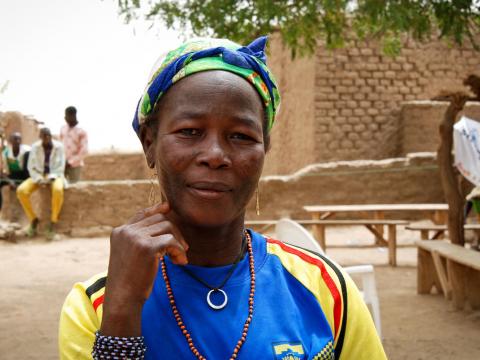I Stand Amongst Heroes

By Samuel K. Owusu-Baafi, Communications Manager for Mali, Mauritania and Niger.
I've been asked numerous times a simple question; a question for which everyone seems to have a predetermined and robotic answer. From "I just love what I do" to "I can't wait to wake up in the morning and get to do what fulfils me". The question is, of course, "why do you do what you do?" Having worked in the humanitarian sector for over five years as a communicator, I've had a lot of time to mull over the question. I usually come up with the same generic, even if accurate, answers.
Not too long ago, I had the opportunity to spend time in Diffa, Niger. Doesn't ring a bell? What about I had the chance to work in the Lake Chad Basin? I think some of you have caught on. The Lake Chad Basin Crisis is the definition of a forgotten crisis. A situation so dire, yet so perpetual, that it becomes routine. In this region of West Africa, the state of emergency is the new norm, but we often forget the faces and names of those living in such dire straits.
"In this region of West Africa, the state of emergency is the new norm"
Sitting in my comfortable 4x4, bouncing up and down the undulating plains of the region, heading towards Sayam Forage Refugee Camp, I was struck by only one thing; this is a tough go. Then I remembered that I was sitting in a 4x4. BAM! Suddenly a sombre reality hit me; those forced to live out here don't have this luxury but somehow have to make it work. I sat in silence as we rolled into the camp, greeted by warm smiling faces; men, women and children alike. This was not the welcome I expected from people living in tents with no electricity, running water or internet. This could not be the welcome of those forced from their homes, the land of their ancestors, where they were born and raised, played and traded in the streets.
Heroic is the word that comes to mind when I think of the people of Sayam Forage, N'guiguimi, Gagamari and the other camps dotted around the vast region of Diffa.
"These are the giants whose stories I tell."
Now when asked why I do what I do, I have a great answer. I do it for Aisha Adam, the leader of her community who reached out to World Vision to provide her community with water, sanitation and hygiene. I do it for Ousmane Aboubakar, a 17-year-old boy who has never been to school, but through World Vision's Early Recovery Project, can now learn metalwork to make something of himself and not be relegated to the ranks of crime or extremism. I do it for Fati Kiari, who had never been employed but through World Vision's Savings Groups now has her own trading business and experiencing the joy of providing for her children. I do it for Fanna Moustapha, a 12-year-old girl who witnessed unspeakable violence at the tender age of eight. Forced to flee her home, she lived in the middle of nowhere in a foreign land, yet fought to overcome her trauma to reclaim her childhood with the help of Child-Friendly Spaces volunteers. These are the giants whose stories I tell. Why do I do what I do? Who wouldn't want to be part of a hero's story?